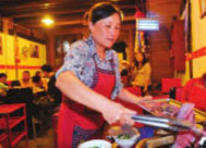| Pick Yourself Up, Dust Yourself Off
By TANG PING
WHEN you fall down, other people may try to help you, but you should get up by yourself," said Song Xiangli, owner of a hotpot restaurant in Shuimo Town, Wenchuan County, Aba Tibetan and Qiang Autonomous Prefecture.
All of the dozen of tables in her restaurant are occupied. Song's 81-year-old mother is busy in the kitchen with the other chefs; and her cousin helps other waitresses look after the guests.
 |
|
Song Xiangli at her hotpot restaurant. |
When the deadly earthquake happened on May 12, 2008, Song was at her job in Yingxiu Town, the epicenter. Desperately worried about her family, she risked one aftershock after another to walk the many kilometers to her home in Shuimo Town. Fortunately, her parents and her son, a middle school student in Wenchuan, were safe. But the town, home to a population of over 20,000 Qiang, Tibetan, Hui, and Han people, was seriously damaged; 311 people died and 3,701 were injured. The direct economic loss reached RMB 5.8 billion. Song's family home was destroyed.
Now Song's mother helps her at the restaurant, but mother and daughter argue frequently. "My mom is a real treasure. I like to go head to head with her – it's a lot of fun," Song said cheerfully of the new kind of rapport and intimacy that has developed between them since the disaster. After being laid off in 1998, Song and her husband left their hometown for job opportunities in other areas, and were preoccupied with making more money. The minute she reunited with her family, Song realized that what they had gone in search of – economic comfort – was probably not the most important ingredient in happiness.
Now her new home looks much as it did before the fateful disaster. Her neat two-storey house of over 500 square meters keeps the characteristics of traditional local constructions – an open octagonal terrace in the middle; lintels, window frames, beams and eaves delicately carved and painted. The entire place has a quaint and dignified atmosphere, as aid building crews restored it in accordance with the original style. "When we rebuilt the house, a specialist from Foshan, Guangdong Province, found it was a typical traditional post-and-beam wooden construction, so he put forward a protective restoration plan," Song recalled. "They used the original bricks and tiles, doors and windows, beams and eaves as far as possible. They reinforced the small octagonal terrace, which was a feature rare to northeastern Sichuan Province. The restoration work was totally free," Song's voice was full of gratitude.
The entire town has seen a revival. Foshan is Shuimo Town's aid partner. Aid workers from the city researched the history, geography and ethic mix of the community, then decided to rebuild it as a new "ecological town with ethnic Qiang features." Sixty-three high energy-consuming or polluting factories were relocated or shut down; tourism will replace them as the pillar industry of the local economy.
Meanwhile, Song's restaurant is boomsing as more tourists make it to their Sichuan hideaway. She used to stroll the old streets early in the morning to keep abreast of the changes. If she stayed at home for several days in a row, she explained, the new shops and new people would suddenly make her feel disoriented.
"A few thousand yuan a month is enough for my needs," Song vows. "People who survived the disaster have learnt not to be greedy. Our lives now are far better than we could even imagine before."
------------------------
TANG PING is a journalist at China Economic Times.
|
